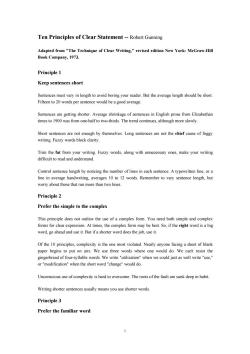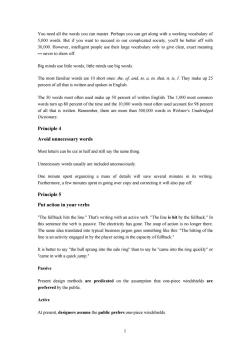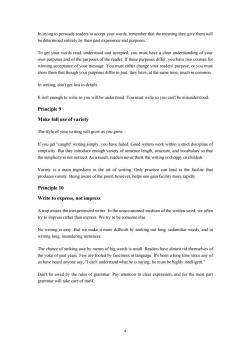上海交通大学:《英语写作 English Writing》课程教学资源(讲义)Ten Principles of Clear Statement

Ten Principles of Clear Statement--Robert Gunning Adapted from "The Technique of Clear Writing,"revised edition New York:McGraw-Hill Book Company,1973. Principle 1 Keep sentences short Sentences must vary in length to avoid boring your reader.But the average length should be short. Fifteen to 20 words per sentence would be a good average. Sentences are getting shorter.Average shrinkage of sentences in English prose from Elizabethan times to 1900 was from one-half to two-thirds.The trend continues,although more slowly. Short sentences are not enough by themselves.Long sentences are not the chief cause of foggy writing.Fuzzy words block clarity. Trim the fat from your writing.Fuzzy words,along with unnecessary ones,make your writing difficult to read and understand. Control sentence length by noticing the number of lines in each sentence.A typewritten line,or a line in average handwriting,averages 10 to 12 words.Remember to vary sentence length,but worry about those that run more than two lines. Principle 2 Prefer the simple to the complex This principle does not outlaw the use of a complex form.You need both simple and complex forms for clear expression.At times,the complex form may be best.So,if the right word is a big word,go ahead and use it.But if a shorter word does the job,use it. Of the 10 principles,complexity is the one most violated.Nearly anyone facing a sheet of blank paper begins to put on airs.We use three words where one would do.We can't resist the gingerbread of four-syllable words.We write "utilization"when we could just as well write "use," or "modification"when the short word "change"would do. Unconscious use of complexity is hard to overcome.The roots of the fault are sunk deep in habit. Writing shorter sentences usually means you use shorter words. Principle 3 Prefer the familiar word
1 Ten Principles of Clear Statement -- Robert Gunning Adapted from "The Technique of Clear Writing," revised edition New York: McGraw-Hill Book Company, 1973. Principle 1 Keep sentences short Sentences must vary in length to avoid boring your reader. But the average length should be short. Fifteen to 20 words per sentence would be a good average. Sentences are getting shorter. Average shrinkage of sentences in English prose from Elizabethan times to 1900 was from one-half to two-thirds. The trend continues, although more slowly. Short sentences are not enough by themselves. Long sentences are not the chief cause of foggy writing. Fuzzy words block clarity. Trim the fat from your writing. Fuzzy words, along with unnecessary ones, make your writing difficult to read and understand. Control sentence length by noticing the number of lines in each sentence. A typewritten line, or a line in average handwriting, averages 10 to 12 words. Remember to vary sentence length, but worry about those that run more than two lines. Principle 2 Prefer the simple to the complex This principle does not outlaw the use of a complex form. You need both simple and complex forms for clear expression. At times, the complex form may be best. So, if the right word is a big word, go ahead and use it. But if a shorter word does the job, use it. Of the 10 principles, complexity is the one most violated. Nearly anyone facing a sheet of blank paper begins to put on airs. We use three words where one would do. We can't resist the gingerbread of four-syllable words. We write "utilization" when we could just as well write "use," or "modification" when the short word "change" would do. Unconscious use of complexity is hard to overcome. The roots of the fault are sunk deep in habit. Writing shorter sentences usually means you use shorter words. Principle 3 Prefer the familiar word

You need all the words you can master.Perhaps you can get along with a working vocabulary of 5,000 words.But if you want to succeed in our complicated society,you'll be better off with 30,000.However,intelligent people use their large vocabulary only to give clear,exact meaning 一never to show off. Big minds use little words;little minds use big words. The most familiar words are 10 short ones:the,of,and,to,a,in,that,it,is,I.They make up 25 percent of all that is written and spoken in English. The 50 words most often used make up 50 percent of written English.The 1,000 most common words turn up 80 percent of the time and the 10,000 words most often used account for 98 percent of all that is written.Remember,there are more than 500,000 words in Webster's Unabridged Dictionary Principle 4 Avoid unnecessary words Most letters can be cut in half and still say the same thing. Unnecessary words usually are included unconsciously. One minute spent organizing a mass of details will save several minutes in its writing. Furthermore,a few minutes spent in going over copy and correcting it will also pay off. Principle 5 Put action in your verbs "The fullback hits the line."That's writing with an active verb."The line is hit by the fullback."In this sentence the verb is passive.The electricity has gone.The snap of action is no longer there. The same idea translated into typical business jargon goes something like this:"The hitting of the line is an activity engaged in by the player acting in the capacity of fullback." It is better to say "the bull sprang into the sale ring"than to say he "came into the ring quickly"or "came in with a quick jump." Passive Present design methods are predicated on the assumption that one-piece windshields are preferred by the public. Active At present,designers assume the public prefers one-piece windshields. 2
2 You need all the words you can master. Perhaps you can get along with a working vocabulary of 5,000 words. But if you want to succeed in our complicated society, you'll be better off with 30,000. However, intelligent people use their large vocabulary only to give clear, exact meaning — never to show off. Big minds use little words; little minds use big words. The most familiar words are 10 short ones: the, of, and, to, a, in, that, it, is, I. They make up 25 percent of all that is written and spoken in English. The 50 words most often used make up 50 percent of written English. The 1,000 most common words turn up 80 percent of the time and the 10,000 words most often used account for 98 percent of all that is written. Remember, there are more than 500,000 words in Webster's Unabridged Dictionary. Principle 4 Avoid unnecessary words Most letters can be cut in half and still say the same thing. Unnecessary words usually are included unconsciously. One minute spent organizing a mass of details will save several minutes in its writing. Furthermore, a few minutes spent in going over copy and correcting it will also pay off. Principle 5 Put action in your verbs "The fullback hits the line." That's writing with an active verb. "The line is hit by the fullback." In this sentence the verb is passive. The electricity has gone. The snap of action is no longer there. The same idea translated into typical business jargon goes something like this: "The hitting of the line is an activity engaged in by the player acting in the capacity of fullback." It is better to say "the bull sprang into the sale ring" than to say he "came into the ring quickly" or "came in with a quick jump." Passive Present design methods are predicated on the assumption that one-piece windshields are preferred by the public. Active At present, designers assume the public prefers one-piece windshields

Passive When an application of wax is made to this surface a brilliance is imparted to it. Active Waxing this surface brightens it. Principle 6 Write like you talk Some grammarians would insist that"write like you talk"is poor grammar.They prefer "write as you talk."But this violates the rule "write like you talk." "Write like you talk"has its limitations.Most of us do talk rather untidy English.We repeat ourselves.We pause.We hesitate.However,in our speech we do not use long,involved sentences laden with multi-syllable words that usually occur in our writing. "Write like you talk"also has its limitations when it comes to news writing.Newspapers-many at least-still prefer that news stories be written in inverted pyramid style and in an impersonal manner. Principle 7 Use terms your reader can picture Avoid fuzzy words."Conditions,""situations,""facilities,""inadequacies"are typical examples. An engineer might say an alloy is"not fabricable."This is a general term that might mean several things.When asked for a more specific meaning,the engineer might say "the alloy cracks when it is cold-rolled." Principle 8 Tie in with your reader's experience Much communication fails because writers ignore readers'beliefs,ignore how they came by them, and how firmly they hold them. Words are not fixed.They vary in meaning from person to person,the meaning depending upon the experience of that person and the pictures the words call to mind. Highly abstract terms often are useful for thinking,but they are tricky in communication because they are open to such wide interpretation. 3
3 Passive When an application of wax is made to this surface a brilliance is imparted to it. Active Waxing this surface brightens it. Principle 6 Write like you talk Some grammarians would insist that "write like you talk" is poor grammar. They prefer "write as you talk." But this violates the rule "write like you talk." "Write like you talk" has its limitations. Most of us do talk rather untidy English. We repeat ourselves. We pause. We hesitate. However, in our speech we do not use long, involved sentences laden with multi-syllable words that usually occur in our writing. "Write like you talk" also has its limitations when it comes to news writing. Newspapers — many at least — still prefer that news stories be written in inverted pyramid style and in an impersonal manner. Principle 7 Use terms your reader can picture Avoid fuzzy words. "Conditions," "situations," "facilities," "inadequacies" are typical examples. An engineer might say an alloy is "not fabricable." This is a general term that might mean several things. When asked for a more specific meaning, the engineer might say "the alloy cracks when it is cold-rolled." Principle 8 Tie in with your reader's experience Much communication fails because writers ignore readers' beliefs, ignore how they came by them, and how firmly they hold them. Words are not fixed. They vary in meaning from person to person, the meaning depending upon the experience of that person and the pictures the words call to mind. Highly abstract terms often are useful for thinking, but they are tricky in communication because they are open to such wide interpretation

In trying to persuade readers to accept your words,remember that the meaning they give them will be determined entirely by their past experience and purposes. To get your words read,understood and accepted,you must have a clear understanding of your own purposes and of the purposes of the reader.If these purposes differ,you have two courses for winning acceptance of your message.You must either change your readers'purpose,or you must show them that though your purposes differ in part,they have,at the same time,much in common. In writing,don't get lost in details. It isn't enough to write so you will be understood.You must write so you can't be misunderstood. Principle 9 Make full use of variety The style of your writing will grow as you grow. If you get"caught"writing simply,you have failed.Good writers work within a strict discipline of simplicity.But they introduce enough variety of sentence length,structure,and vocabulary so that the simplicity is not noticed.As a result,readers never think the writing is choppy or childish. Variety is a main ingredient in the art of writing.Only practice can lead to the facility that produces variety.Being aware of the point,however,helps one gain facility more rapidly. Principle 10 Write to express,not impress A trap awaits the inexperienced writer.In the unaccustomed medium of the written word,we often try to impress rather than express.We try to be someone else No writing is easy.But we make it more difficult by seeking out long,unfamiliar words,and in writing long,meandering sentences. The chance of striking awe by means of big words is small.Readers have almost rid themselves of the yoke of past years.Few are fooled by fanciness in language.It's been a long time since any of us have heard anyone say,"I can't understand what he is saying;he must be highly intelligent." Don't be awed by the rules of grammar.Pay attention to clear expression,and for the most part grammar will take care of itself
4 In trying to persuade readers to accept your words, remember that the meaning they give them will be determined entirely by their past experience and purposes. To get your words read, understood and accepted, you must have a clear understanding of your own purposes and of the purposes of the reader. If these purposes differ, you have two courses for winning acceptance of your message. You must either change your readers' purpose, or you must show them that though your purposes differ in part, they have, at the same time, much in common. In writing, don't get lost in details. It isn't enough to write so you will be understood. You must write so you can't be misunderstood. Principle 9 Make full use of variety The style of your writing will grow as you grow. If you get "caught" writing simply, you have failed. Good writers work within a strict discipline of simplicity. But they introduce enough variety of sentence length, structure, and vocabulary so that the simplicity is not noticed. As a result, readers never think the writing is choppy or childish. Variety is a main ingredient in the art of writing. Only practice can lead to the facility that produces variety. Being aware of the point, however, helps one gain facility more rapidly. Principle 10 Write to express, not impress A trap awaits the inexperienced writer. In the unaccustomed medium of the written word, we often try to impress rather than express. We try to be someone else. No writing is easy. But we make it more difficult by seeking out long, unfamiliar words, and in writing long, meandering sentences. The chance of striking awe by means of big words is small. Readers have almost rid themselves of the yoke of past years. Few are fooled by fanciness in language. It's been a long time since any of us have heard anyone say, "I can't understand what he is saying; he must be highly intelligent." Don't be awed by the rules of grammar. Pay attention to clear expression, and for the most part grammar will take care of itself
按次数下载不扣除下载券;
注册用户24小时内重复下载只扣除一次;
顺序:VIP每日次数-->可用次数-->下载券;
- 上海交通大学:《英语写作 English Writing》课程教学资源(PPT课件讲稿)Lecture 9 Methods of development(2/2).ppt
- 上海交通大学:《英语写作 English Writing》课程教学资源(PPT课件讲稿)Lecture 8 Coherence.ppt
- 上海交通大学:《英语写作 English Writing》课程教学资源(PPT课件讲稿)Lecture 8 Methods of Development(1/2)Argumentation.ppt
- 上海交通大学:《英语写作 English Writing》课程教学资源(PPT课件讲稿)Lecture 7 Topic sentence.pptx
- 上海交通大学:《英语写作 English Writing》课程教学资源(PPT课件讲稿)Lecture 7 Support.ppt
- 上海交通大学:《英语写作 English Writing》课程教学资源(PPT课件讲稿)Lecture 6 Introduction to Essay Development.ppt
- 上海交通大学:《英语写作 English Writing》课程教学资源(PPT课件讲稿)Lecture 6 Coherence.ppt
- 上海交通大学:《英语写作 English Writing》课程教学资源(PPT课件讲稿)Lecture 5 Unity and Topic Sentence.ppt
- 上海交通大学:《英语写作 English Writing》课程教学资源(PPT课件讲稿)Lecture 5 Sentence(2/2)practice.ppt
- 上海交通大学:《英语写作 English Writing》课程教学资源(PPT课件讲稿)Lecture 4 Sentence(1/2).ppt
- 上海交通大学:《英语写作 English Writing》课程教学资源(PPT课件讲稿)Lecture 3 Word Choice.ppt
- 上海交通大学:《英语写作 English Writing》课程教学资源(PPT课件讲稿)Lecture 3 Introduction to Essay Development.ppt
- 上海交通大学:《英语写作 English Writing》课程教学资源(PPT课件讲稿)Lecture 2 Differences in Writing between Chinese and English.ppt
- 上海交通大学:《英语写作 English Writing》课程教学资源(PPT课件讲稿)Lecture 12 Word Choice.ppt
- 上海交通大学:《英语写作 English Writing》课程教学资源(PPT课件讲稿)Lecture 12 How to write Personal Statement.ppt
- 上海交通大学:《英语写作 English Writing》课程教学资源(PPT课件讲稿)Lecture 11 Sentence(2)practice.ppt
- 上海交通大学:《英语写作 English Writing》课程教学资源(PPT课件讲稿)Lecture 11 Cover-letter Writing.ppt
- 上海交通大学:《英语写作 English Writing》课程教学资源(PPT课件讲稿)Lecture 10 Sentence-making(1).ppt
- 上海交通大学:《英语写作 English Writing》课程教学资源(PPT课件讲稿)Lecture 10 Methods of development.ppt
- 上海交通大学:《英语写作 English Writing》课程教学资源(PPT课件讲稿)Lecture 1 Overview of the Approach to English Writing.ppt
- 《English Writing 英语写作》教学资源:The Element of Style(William Strunk, Jr.).pdf
- 《English Writing 英语写作》教学资源:The Science of Scientific Writing.pdf
- 上海交通大学:《英语写作 English Writing》课程教学资源(PPT课件讲稿)Topic sentence.pptx
- 《English Writing 英语写作》教学资源:The Writing Center at UNC-Chapel Hill.pdf
- 《English Writing 英语写作》教学资源:新概念英语难句赏析.pdf
- 《广东外语外贸大学学报》:浅析非英语专业大学生英语写作的若干问题——基于 CLEC 语料库及问卷调查的研究(新罕布什尔大学:张西芳).pdf
- 《外语教学》:英汉学术论文开头段语篇模式和思维方式对比分析(东北师范大学外语学院:杨玉晨).pdf
- 《English Writing 英语写作》教学资源:(美)欧文·M·柯匹卡尔·科恩丹尼尔·E·弗莱格《逻辑要义》PDF电子书.pdf
- 上海交通大学:《礼记(选读)》课程教学资源_选读课程须知(唐启翠).pdf
- 上海交通大学:《礼记(选读)》课程教学资源_进食之礼——说古道今话礼仪(学生版).pdf
- 上海交通大学:《礼记(选读)》课程教学资源_始诸饮食——礼的起源、演进与人类文明(学生版).pdf
- 上海交通大学:《礼记(选读)》课程教学资源_期中课堂考核优秀PPT(大学).pptx
- 上海交通大学:《礼记(选读)》课程教学资源_期中课堂考核优秀PPT(中庸).pptx
- 上海交通大学:《礼记(选读)》课程教学资源_期中课堂考核优秀PPT(中庸).pptx
- 上海交通大学:《礼记(选读)》课程教学资源(讲义)第1-2讲 进食之礼——说古道今话礼仪.pdf
- 上海交通大学:《礼记(选读)》课程教学资源(讲义)第11讲 人生礼仪之《昏义》选读.pdf
- 上海交通大学:《礼记(选读)》课程教学资源(讲义)第14-15讲 琢玉成器——礼记与学校礼仪(《学记》讲读).pdf
- 上海交通大学:《礼记(选读)》课程教学资源(讲义)第3-4讲 始诸饮食——礼的起源、演进与人类文明进程.pdf
- 上海交通大学:《礼记(选读)》课程教学资源(讲义)第5-6讲 君子如玉——礼记与儒家三观(《中庸》、《玉藻》选读).pdf
- 上海交通大学:《礼记(选读)》课程教学资源(讲义)第7-8讲 报本反始——礼记与祭祀礼仪(《祭法》、《祭义》、《祭统》、《郊特牲》选读).pdf
